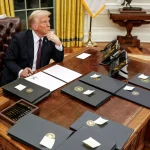There was a time when many believed that American leaders would put the needs of ordinary citizens above all else. Today, that belief feels distant. As economic policies accelerate toward deeper spending cuts, and as corporate-aligned media tighten their hold on public perception, it’s clear that something darker is at play. We are witnessing the calculated dismantling of civic trust, the centralization of wealth, and the emergence of an elite ideology with authoritarian undertones.
Budget cuts are often sold as responsible governance, a way to reduce national debt or boost efficiency. But the real consequences are far more severe. These reductions affect everyday services—public schools, healthcare systems, community programs. When the federal government slashes funding by the trillions, it’s not the wealthy who feel the impact; it’s the working class, the poor, the vulnerable. It’s families who see their children crowded into classrooms, patients who wait longer for care, and communities who lose critical resources.
At the same time, tax cuts are portrayed as economic wins. Many Americans assume they will see the benefits directly, but those benefits rarely trickle down. The truth is, most tax relief disproportionately helps the wealthy. Instead of stimulating the economy for everyone, it exacerbates inequality. With fewer public funds, services decline. With more concentrated wealth, the elite tighten their grip on policy and influence.
This dynamic is no accident. It is enabled by a deliberate narrative, one controlled and perpetuated by those who benefit most. The political and media ecosystems are increasingly influenced by figures who use wealth and ideology to manipulate public discourse. Billionaires like Peter Thiel and political thinkers like Curtis Yarvin promote visions that challenge democratic norms altogether. Thiel has openly questioned the value of democracy, while Yarvin advocates for centralized, monarchical-style governance. These are not fringe ideas—they are actively shaping modern political strategy.
Donald Trump, in many ways, became a vehicle for this ideology. Whether knowingly or not, his administration advanced policies that aligned with oligarchic goals: reducing oversight, weakening democratic institutions, and feeding populist resentment while enriching the powerful. To many, he functions as a Trojan horse for those who see democracy as inefficient or expendable.
The results are visible across the country. The working class continues to lose ground—economically, socially, and politically. Wages stagnate, job security erodes, and basic needs become harder to meet. Yet the public is fed narratives that frame these struggles as personal failures rather than systemic ones. Media outlets like Fox News, for example, regularly present economic stories that favor elite interests while disregarding the realities of working people. This creates confusion, division, and disengagement—further isolating citizens from the levers of change.
Misinformation is not just a byproduct of this system—it is a weapon. When media platforms reinforce the status quo under the guise of objectivity or tradition, they give their audiences permission to ignore inequality. Many working-class viewers are misled into believing that tax cuts benefit them, or that public services are wasteful, while the policies actually working against them are cloaked in patriotic language.
This manipulation is reinforced by the socio-economic makeup of the audiences consuming it. Affluent viewers are rarely confronted with the harsh realities of poverty or systemic injustice. Meanwhile, working-class individuals may adopt narratives that run counter to their own interests, numbed by years of economic strain and alienation from political power.
Yet, resistance is growing. Political leaders like Bernie Sanders and Alexandria Ocasio-Cortez are drawing record crowds and attention for their direct advocacy on behalf of working families. Their grassroots momentum signals a rejection of corporate-dominated politics. They offer policies that center healthcare, education, labor rights, and environmental justice—all rooted in real-world struggles. Their approach is not just rhetorical; it reflects lived experience and a commitment to equity.
These movements are gaining traction because they speak to the reality so many Americans face. Sanders’s systemic critiques and Ocasio-Cortez’s personal authenticity offer a contrast to polished but hollow political messaging. Together, they represent an emerging coalition of citizens who demand more than survival—they want representation, dignity, and fairness.
At its core, this moment in history is about the collision between concentrated wealth and democratic possibility. The more power shifts into the hands of a few, the more the rules change to protect them. That is the oligarchs’ playbook: reduce transparency, limit civic engagement, and erode trust until democracy becomes a formality, not a function.
If we are to push back, we must first understand the game being played. That means interrogating the media we consume, the policies we support, and the leaders we elevate. It also means rejecting the idea that inequality is inevitable. The system is built by people—and it can be changed by people.
Political engagement is no longer optional. Voting, organizing, educating—these are the tools we have, and they must be used deliberately. The time for passive observation has passed. When misinformation thrives, when inequality deepens, and when power rewrites the rules, silence becomes complicity.
The future of American democracy depends on an informed, active, and compassionate public. If we want a society that works for all—not just the privileged few—we must fight for it. That fight begins with knowledge, empathy, and a refusal to accept anything less than justice.


